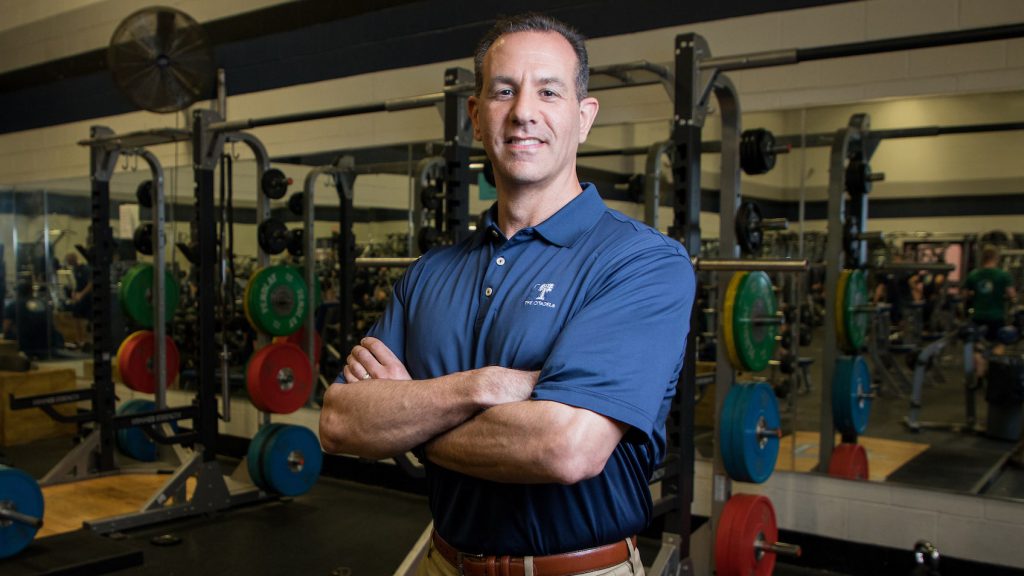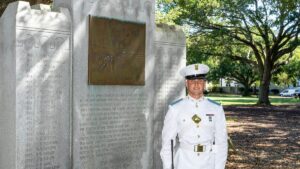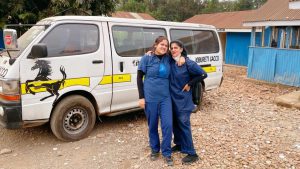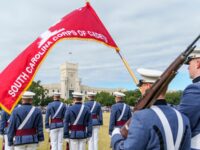
“We are at a crisis in this country, where 75 percent of young Americans who want to serve in the military don’t qualify,” said exercise science professor Maj. Dan Bornstein. “The largest reason is that they’re either too fat, too unfit or both.”
Bornstein, 47, began to realize the importance of physical fitness at the young age of 11.
“It was Valentine’s Day, and I thought it would be a good idea to try to set the world record for stair jumping. We lived in an old Victorian house with 14-foot ceilings. I was perched at the top of the stairs, with my hands positioned to slide down the rail. When I launched forward and my center of mass moved past my hands, my hands slipped, and I landed flat on my back.”
The firefighters who responded to the emergency call that day in 1983 made such an impression on Bornstein that he vowed at that moment to become a volunteer firefighter.
Instead of a new world record, Bornstein had three broken ribs. Six months later, he would learn that he also had two fractures in his vertebrae, two herniated discs and one vertebra that was pressing on his spinal cord.
It was a life-changing injury. He was taken out of youth sports and put into a back brace for two years. When immobilization didn’t work, he tried physical therapy.
“I learned then that exercise can heal,” he said. “And it led me to recognize the powers of physical fitness and to make a lifelong commitment to being fit.”
When he turned 18, Bornstein knocked on the door of the local fire department and asked for an application.
“It was my first taste of public service—being part of a team where people rely on each other in life-and-death situations. As a firefighter, I saw some ugly things, but I also came to fully appreciate the importance of being physically and mentally fit in order to contribute to a team.”
After college, Bornstein owned several fitness companies dedicated to helping people make lifestyle changes, but after a number of years, his focus began to shift. Instead of helping a small segment of the population, he became passionate about making an even bigger difference, so he began working on his doctoral degree in exercise science at the University of South Carolina with a focus on physical activity and public health. He was 36.
“The greatest public health wins we’ve had in this country—tobacco control, vaccinations, seat belts—have come as a result of policy changes. Policies determine environments, and environments largely determine behavior. The scientists on whose shoulders I now stand have been researching physical activity and its importance to health for decades. They have been using health as the dominant message when advocating for policy change, and the problems are getting worse—obesity is increasing, and we are less physically and mentally fit than we have ever been.”
That’s when Bornstein realized that the message needed to change.
“With tobacco control, for example, and the laws that led to taxes on cigarettes, and limiting where and when you can smoke—those policy decisions came not from the evidence of the detrimental effects of smoking on the individual smoker, but from the evidence of the detrimental effects of second-hand smoke. Finally, lawmakers stepped in and said, ‘It’s not lawful for you to smoke your coworker to death or your children to death.’
I started to ask myself, ‘What is the second-hand smoke of physical inactivity?’ That’s when I realized it’s military readiness and national security.”
With that epiphany, Bornstein brought his ideas and his passion to The Citadel in 2013.
“Part of the reason I came to The Citadel is that it’s a military college. I felt that by being here, where leadership is central to the mission of the college, I would have the opportunity to collaborate with others to help The Citadel play a role in demonstrating the importance of physical, mental and psychological fitness, not only for the health of our population, but also for the safety and security of our state and nation.”
In the six years that he’s been at The Citadel, Bornstein has been busy. He’s worked with the commandant’s office and the department of athletics to create a physical readiness officer program that enables cadets to assist other cadets in improving the physical training program. He’s conducted several research studies in collaboration with the psychology department on mental and psychological fitness. He has published a book and developed a class on the relationship between physical activity and national security. He has a number of other initiatives underway, including a new online graduate certificate program in tactical performance and resiliency. And he is working on community outreach programs to train military personnel, first responders and veterans on how to optimize their physical, behavioral and psychological fitness.
Bornstein is committed to helping South Carolina become the solution to the problem instead of being the problem itself.
“We have an obligation to graduate young men and women who have the drive to maintain not only their own fitness and health, but that of their families, co-workers and communities. We are poised to help lead the way in solving some of the most pressing fitness, health and security issues of our time. If The Citadel’s not going to lead the way in improving the fitness of tomorrow’s leaders as well as today’s military personnel, veterans and first responders, then who will?”

 Cadet Coleman Bland wins 2023 Star of the West competition
Cadet Coleman Bland wins 2023 Star of the West competition Citadel professor teaches compassion in the classroom and out of the country
Citadel professor teaches compassion in the classroom and out of the country Black History Month: a look back at the emergency medics that help shape the field of EMS
Black History Month: a look back at the emergency medics that help shape the field of EMS


